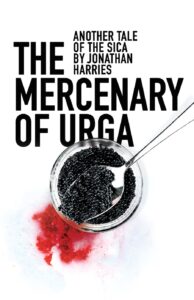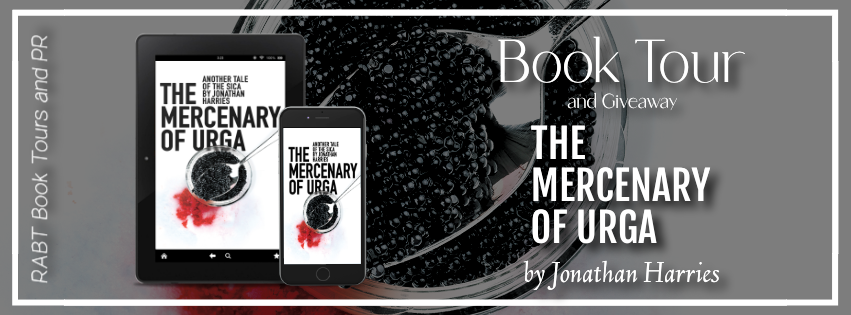Historical adventure author Jonathan Harries stops by today to chat with me about his new novel, The Mercenary of Urga.

He’s in the midst of doing a tour with RABT Book Tours. Feel free to visit his other stops along the way, too!
Welcome, Jonathan. Please tell us a little bit about yourself.
I grew up in Namibia, an extraordinarily beautiful and wild country where the desert meets the sea, with not a blade of grass in between.
In 1986 we emigrated to the US where I got a job as a copywriter at Grey Advertising in New York.
After a reasonably successful career, I retired as Global Chairman of Foote Cone & Belding five years ago and began to write.
My first series of novels is about saving wildlife from poachers, animal traffickers and trophy hunters. It’s a subject close to my heart and every cent I make on all my books goes to various animal and environmental charities.
My second series, Tales of the sica, tells the story of my family’s nearly 2000-year-old assassination business.
Please tell us about your current release.
This is the third in the Tales of the Sica series to feature my great-uncle Leon, a man who resembled neither a master assassin nor a great lover – and yet he was both. Uncle Leon, the most successful assassin in the family’s nearly 2000-year-old murder-for-hire-business, is once again contracted by the head of the British Secret Service to take out one of the last – and worst – of the White Russian Generals. WWI is over and the Russian Revolution is on its last legs as the Bolsheviks slowly destroy the last of the White royalist armies. But deep in the wilds of Mongolia, a mad General, Baron Roman von Ungern-Sternberg, has plans to establish a new Russian Empire with the aid of a battalion of kidnapped under-age British soldiers.
What inspired you to write this book?
Great-uncle Leon died an impressive – if perhaps unsavory – death in the arms of his fifty-five-year-old girlfriend. He was at least eighty-six at the time. In the few years I got to spend with him, he filled my head and imagination with the tales and exploits of his misspent youth as a raconteur and adventurer in the most extraordinary of places.
Excerpt from The Mercenary of Urga:
It was not a big camp, and Leon didn’t imagine there could have been more than eight hundred soldiers plus their horses and a few camels. He looked around to see if there was a bigger tent for the baron, but he didn’t see one. At the end of the camp on a small hill was a group of soldiers in Cossack uniforms huddled around an open lean-to. Sitting at a table in the middle was a thin man with red hair, a short beard, and a big, bushy moustache. He stopped writing in a leatherbound book when he saw Leon and Chuluun and waved his arm for the Cossacks to move back. Then he fixed Leon in a stare that was even more terrifying than that of Rasputin. “Come,” he said, pointing at a camp chair next to the one in which he was sitting. “Come sit, Mr. Mercenary, and tell me why I shouldn’t just kill you.”
“Because,” replied Leon, “I’d kill you first.”
With a roar the baron shot to his feet, knocking over his chair and making a grab for his saber, which lay on the table. Von Ungern-Sternberg was fast, but his hand hadn’t touched the hilt of his saber when he felt the tip of Leon’s sica rip through his long coat and prick the muscle that protected his liver. The Cossacks ran forward but the baron yelled for them to stop. Then he began to cackle like a demented witch until his eyes, which were like blue ice, filled with tears.
“General Biskupsky was wrong about you. You are not just a mercenary; you are the Lord of Mercenaries. That’s what you shall be known as from now on.”
What exciting project are you working on next?
I am busy with two books at the moment. The first is a prequel to the The Carpet Salesman of Baghdad and takes place on the island of Rhodes in 1840. The second is a stand-alone (or perhaps the first in a series) about a naked-yoga instructor being pursued from her studio in Miami to a game reserve in South Africa by two horrific hitmen, hired by the head of a Mexican drug cartel.
When did you first consider yourself a writer?
I’ve been writing my whole life. From a quirky play in high school to a movie that if nothing else (and trust me it’s awful) provided me with enough money to put down as a deposit on our first house. I was a copywriter both in the US and South Africa and I ended up retiring as Global Chairman of the same advertising agency that I’d started at as a trainee copywriter so many years before.
Do you write full-time? If so, what’s your workday like? If not, what do you do other than write and how do you find time to write?
After I retired, I started to write full time – although I’m not sure 3 – 4 hours a day would qualify as full-time employment. When I’m not writing or doing nothing (as my wife likes to point out), I read and research and take my dog for a walk.
What would you say is your interesting writing quirk?
Because there are lots of characters in my books who get their “rightful comeuppance,” I love basing the antagonists on various individuals whom I found particularly annoying or nasty during my career.
As a child, what did you want to be when you grew up?
Always wanted to be an archaeologist or historian.
Anything additional you want to share with the readers?
Every cent I make on my books goes to various animal and environmental charities around the world.
Links:
Website | Facebook | Goodreads | Instagram | Amazon

